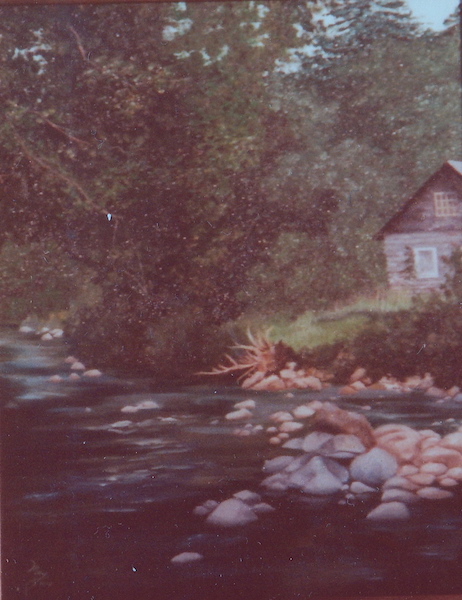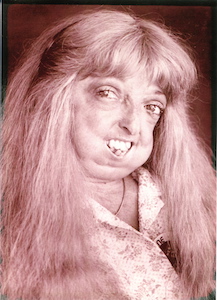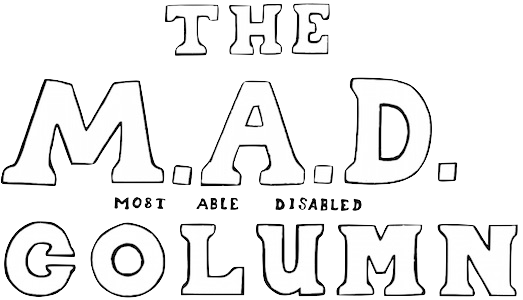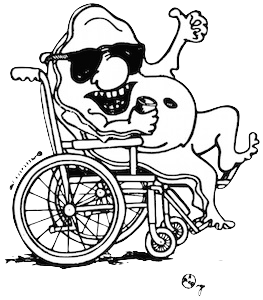
Meg Casey oil painting
courtesy of the Casey family
Doctors And The Disabled
Comforting Others
July 13 1983
Dear Readers,
At the Pocono "Gathering" with 14 other families with progeria, the experience of watching these separate family units melt into one as the days progressed and to feel the warmth of comfort and support given back and forth between them was an overpowering thing. To hear the anguish as one of the children, little 9 year old Gigi from Chile, died of heart failure. His family neither speaking nor understanding the English language, and communicating solely through an interpreter as they told us all to "continue on in joy and hope because that was how Gigi would have wanted it." To sense the fear of the end in the hearts of every parent as they walked away from that little speech in a choked silence and stood watching their own special child running about giggling by the poolside.
To see the absolute torment in the eyes of the new parents when they heard from that scene to me with the conflicting emotions of fear and hope battling for the the supremacy of their spirits. As overwhelming "proud" flashing on and off to them, like neon lights key drove these people to my side repeatedly, continuously to ask "just a few more questions," to touch my hand, or simply sit there quietly and watch me breathe.
The burden of that need was as scary as it was heavy at times. The might of its weight rushing at me was almost enough to make me run away and cry – to hide from my inability to make promises for their child's future longevity filled with only good health, happiness and success. The promises that my maternal instincts understood the need for and that my heart desperately wanted to give.
The questions asked of me will give a view of life with a disability as experienced through loving family members. Everyone in a family is a affected by events which occur in their lives together.
In the end I can't make promises for the future but I could give advice for the present. Enjoy each other now to the fullest and don't concentrate on the questionable tomorrow. If you worry about what is to be come your will have I wasted the time at hand and have missed out on all the joys found and the little details that make your memories so sweet.
Some from the older generations try to brave their way through pain and are reluctant to say when they are in discomfort. One may have to diagnose as a veterinarian does by watching for signs. An example is holding their head from a headache may actually be a mini stroke that can lead to disabling problems down the road.
Treating Handicapped Children
July 27 1983
Dear Meg,
My wife and I often worry about the choices we make for our son. There aren't any answers available for treating progeria.
Dear Concerned Dad,
Inasmuch as progeria is a mystery to medical profession, it was evident to everyone who attended the "gathering in the Poconos" that the degree to which the condition affected the 14 progeriacs present varied from case to case. Some were affected more severely than others. An accurate pattern of the progression for the syndrome was not obvious there regardless of how you lined us up - by age, height, sex or even alphabetically. Therefore, the medical treatment for each of these people is going to be a little different for each of these people from one to the other. Just the name of the treatments of the individual personally involved will have to be a tailored fit to that individual's situation.
A doctor can use the general rules of childrearing together with whatever info they have gotten on how to treat their "special" or handicapped child as a reference point.
They should never become desensitized to the thousand and one warning signals that an unhappy child gives off – the ones that only his loving parents who have nurtured him could be be aware of quickly.
My own childhood was extremely happy. I received a normal education, participating fully in a classroom situation and delighting in extra curricular activities that put me in with my peers. I was very outgoing because I was encouraged to be.
Firsthand Observations Help Diagnose
June 20 1984
Several of the leading researchers and medical physicians studying Progeria visited a group of children with progeria for 2 days during the Sunshine Foundation's 1984 weeklong gathering in the Poconos.
Both medical professionals and parents benefit from listening to one another and sharing their knowledge of the disorder through their own experiences with it. After all a parent is with it 24 hours a day, 365 days out of the year. Round-the-clock observation hours that are invaluable to a researcher are right here at their fingertips. Besides they get to know the precious secret confidences that only a Mommy or Daddy would ever get to know.
Taking Care Of The Caregivers
May 9 1984
Dear Meg,
I just hoped you might be interested in letting people know what a Head Injury Re-Entry therapy program feels like from an insider's view.
A lot of credit is given (and well deserved) to the therapy staff here. Yet, I certainly do not think that anywhere near enough credit is given to the (very able, I think) nursing staff! After all, therapists basically work a 40? 60? hour week. There is some overlapping, (earlier some mornings, later some nights), but nursing staff is with us 25 hours a day, seven days a week. I do not think that they get the respect they deserve. (They are the ones who "wipe bottoms," after all.) They are the ones who wake up in the mornings (not a job I would fancy), deal with us when we are sick, or when we are cranky. For some of us here, they position us at night, give pills and or shots, take temperatures, clean up after an "accident", and most difficult, I think, deal with our being degraded without the benefit of a job for us to be doing.
The nurses here do a DAMN GOOD JOB with us. There are times that, if it were me, I would have slapped me, if someone had done something like things I have done or seen others do. The nurses (and others on the nursing staff, like aides and orderlies) take everything in stride. Amazing. They help us in therapies, especially on weekends, when most of the therapy staff is off. So I just wanted SOMEONE to praise the morning staff.
Ceil
Hello Ceil,
Thanks for writing in. No one could have given the Nursing Staff of the Head Injury Community Re-Entry Program a finer round of applause than you have in this letter.
Your praise in particular is sure to be an extra special bouquet to your nurses and aides. It is nice to know you are appreciated, but it is even nicer to hear it, see it and feel it from those for whom all the efforts are made!
This was a nice gesture on your part.
In home caretakers including family members also deserve thanks and be given breaks from constantly watching their wards.



